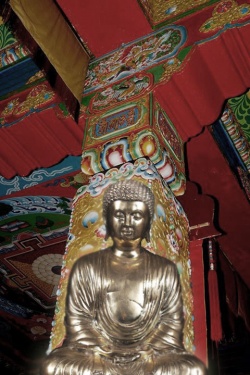Four kayas
The four kayas (Skt. catuḥkāya; Tib. ku shyi; Wyl. sku bzhi) are the
- dharmakaya (Wyl. chos kyi sku),
- sambhogakaya (Wyl. longs spyod rdzogs pa’i sku),
- nirmanakaya (Wyl. sprul pa’i sku), and
- svabhavikakaya (Wyl. ngo bo nyid kyi sku).
dkon mchog gsum - Three Jewels. The Precious Buddha, the Precious Dharma and the Precious Sangha. In The Light of Wisdom (Shambhala Publ.), Jamgön Kongtrül explains: "The Buddha is the nature of the four kayas and five wisdoms endowed with the twofold purity and the perfection of the twofold welfare. The Dharma is what is expressed, the unconditioned truth of total purification comprised of cessation and path, and that which expresses, the two aspects of statement and realization appearing as the names, words and letters of the teachings. The Sangha consists of the actual Sangha, the sons of the victorious ones abiding on the noble bhumis who are endowed with the qualities of wisdom and liberation, and the resembling Sangha who are on the paths of accumulation and joining as well as the noble shravakas and pratyekabuddhas." [RY]
sku dang ye shes - kayas and wisdoms. The four kayas and five wisdoms [RY]
sku bzhi - four kayas [RY]
sku bzhir thugs gsung sku dang ye shes kyi dbye ba bcu drug - the 16-fold classification of Body, Speech, Mind and Wisdom for each of the four kayas [RY]
'mngon par byang chub pa'i sku - abhisambodhikaya. The fifth of the five kayas of buddhahood, defined by Jamgön Kongtrül in his Treasury of Knowledge as 'manifold manifestation in accordance with the karma of those to be influenced, without departing from dharmakaya, that (appears) because the (other four kayas are) spontaneously complete within awareness wisdom.' [RY]
dpal kun tu bzang po'i go phang - level of Shri Samantabhadra [[[buddhahood]], nyingma la depending on the rgyun mtha'i unobstructed path, by empowerment in the fruition of the 'dod chags chen po'i lam snang gsum 'pho ba'i bag chags phra ba sbyangs, as the union of no more learning, the 25 dharmas of fruition dbyer med self-existing nature, having the nature of the four kayas and five wisdoms] [IW]
(bla ma sku bzhi'i gangs ri la,
mos gus kyi nyi ma shar na,
byin rlabs kyi chu rgyun mi 'bebs pas,
sems mos gus 'di la nan tan mdzod.
Unless the sun of devotion shines On the snow peak of the teacher's four kayas, The stream of his blessings will never flow. So earnestly arouse devotion in your mind! ) [RY]
dbang - 1) thob thang, power, force, might, control, potency, influence, authority;
2) (CH) gna' dus go gnas shig;
3) (aabhishinytsa) scatter, pour [having scattered obscurations cleanse the continuum, and into that clean vessel pour the power of wisdom, depending on the cho ga rnam par dag pa. skandhas, dhatus and ayatanas are the special seed of the fruition the four kayas by planting it one's continuum ripens];
4) empowerment, initiation, abhisheka;
5) senses, faculty, sense [[[Wikipedia:organ|organ]]], mental faculty, ability, magnetizing, capacity
(6) ruler, lord, king, sovereignty
(7) [[[rite]] of] subjugation/ dominion
(8) be subject to/ ruled/ governed by/ under the control of {rang dbang},-{gzhan dbang} [one of the {phrin las rnam bzhi: the four karmas] magnetizing [IW]
'bras bu'i chos - 1) fruition dharma;
4) the power of fruition;
5) empowerment of the fruition)/ [[[nirvana]] with remainders of the skandhas and with no remainder and also the four kayas and omniscience. the symbol abhisheka which makes unsurpassable enlightenment, the ultimate fruition of the great light rays empowerment, the empowerment of the fruition of supreme attainment]. [IW]
smin grol - Ripening and liberation. Ripened and freed. Two vital parts of Vajrayana practice: the empowerments which ripen one's being with the capacity to realize the four kayas and the liberating oral instructions enabling one to actually apply the insight introduced through the empowerments [RY]
smin byed kyi dbang - Ripening empowerments. The Vajrayana empowerments which ripen one's being with the capacity to realize the four kayas [RY]
zung 'jug sku bzhi - four kayas of union [RY]
Further Reading
- Dilgo Khyentse Rinpoche, Enlightened Courage—An Explanation of Atisha's Seven Point Mind Training, Padmakara Translation Group (Snow Lion Publications, 2006), pages 51-52.
